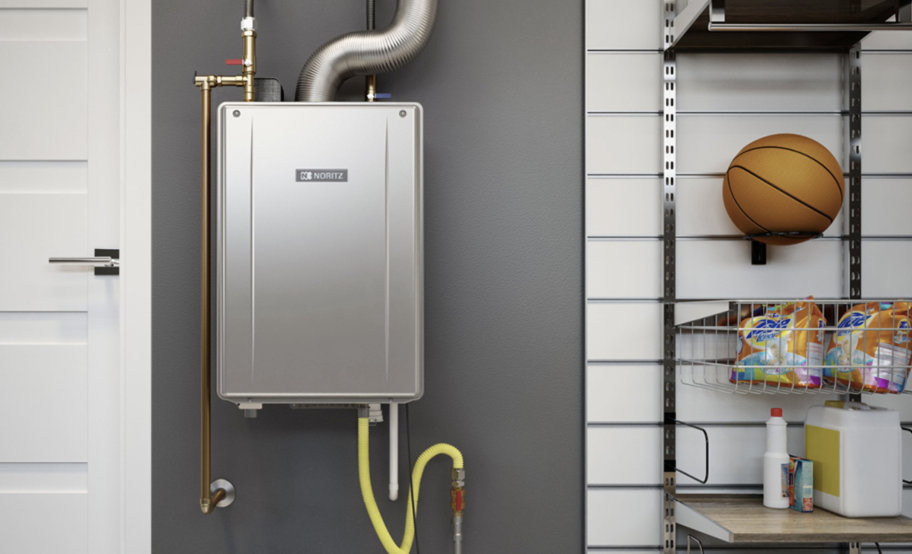If your water heater isn’t working right, or if it’s simply old and inefficient, you’ll need to consider replacing it. While it’s possible to try and install a water heater on your own, it’s usually better to reach out to a professional plumber; plumbers have far more industry expertise, and will be able to install your water heater faster, more reliably, and with virtually no risk of damaging your existing plumbing (if they’re sufficiently experienced).
But even with the help of an expert plumber, you’ll still need to make some important decisions. There are hundreds of types and models of water heater available, and while your plumber may be able to make some recommendations, the final choice will be yours.
One of the newer types of water heater are known as “tankless” water heaters. Traditional water heaters continuously heat and reheat water in a storage tank, distributing it throughout the home when needed. By contrast, tankless heaters make use of high-powered gas burners or electric coils to instantly heat water—so no storage tank is necessary.
It sounds fancy, but are tankless water heaters any better or worse than traditional tank-based water heaters?
The Advantages of Tankless
Tankless water heaters do have a few advantages that make them a top choice for many consumers:
- Instant hot water. Because tankless water heaters are designed to heat water almost instantly, you’ll have access to hot water faster. Tank-based water heaters, once installed, can take many hours to get up to standard temperature.
- Higher efficiency. The biggest perk of tankless water heaters is that they’re more efficient. They use energy in a more concentrated way, heating water more efficiently. More importantly, they don’t suffer from “standby loss,” or the cost of energy to keep stagnant water heated even when you’re not using it. If you’re concerned about your environmental impact or energy consumption, this is a huge selling point.
- Longer life. Tankless water heaters are smaller and have fewer components, so there’s less that can go wrong with them. Accordingly, they have a longer lifespan. Because they’re still relatively new, we don’t have significant data on how long they last before failing, but generally, they should last years longer than a tank-based equivalent in most cases.
- Lower costs (overall). With a tankless water heater, you’re only going to pay for energy to heat the water you actually use; you aren’t going to be spending money to keep an idle tank full of hot water. Accordingly, your heating bills should be lower, and you’ll save money over the lifespan of the unit.
- Possible tax breaks. Depending on what kind of model you buy and where you live, you may qualify for specific tax credits, since tankless water heaters are considered the energy efficient choice. This can make tankless heaters even more financially beneficial.
- Heating options. Tankless water heaters offer lots of flexibility to homeowners, with different models that capitalize on different heating methods. Depending on where you live and/or what your preferences are, you could get a tankless water heater that uses natural gas, electricity, or even solar power.
Are There Disadvantages?
Let’s take a step back. Are there any disadvantages to tankless water heaters?
- Higher costs (initially). Though the long-term use of a tankless water heater will save you money on your utility bills, it’s worth noting that they’re usually more expensive upfront. If you have a limited budget to work with, or if you’re not sure how long you’re going to be living in this home, you may not want to pay the higher upfront costs.
- Inconsistent temperatures. Some tankless water heater users complain that the temperature of their hot water is more inconsistent than it was with a tank-based heater. This is because hot water is generated on demand, and isn’t held at a consistent temperature before deployment; accordingly, one of its biggest strengths is also a weakness.
- Limited supply. Hypothetically, the supply of a tankless water heater is unlimited—at least compared to a tank-based unit, whose water supply can be completely drained. However, tankless heaters try to focus on heating several gallons of water at a time. This is ideal for typical activities, like washing dishes or taking a shower, but its capabilities can still be taxed if you have many people using hot water at once.
- Challenging maintenance. Though missing a tank, some elements of tankless water heaters are more complex, and may require more expensive and/or difficult maintenance.
For the most part, tankless water heaters are better than their traditional counterparts, but they’re not without their weaknesses. If you’re considering a new water heater to replace your old or malfunctioning one, make sure you consider all the pros and cons—and hire a professional plumber to handle the installation.




